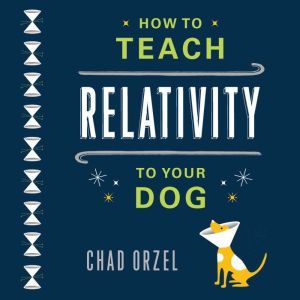

How to Teach Relativity to Your Dog
Author: Chad Orzel
Narrator: Will Collyer, Cassandra Morris
Unabridged: 9 hr 54 min
Format: Digital Audiobook Download
Publisher: Basic Books
Published: 02/11/2020
Categories: Nonfiction, Science, Physics, Space Science, Astronomy, Gravity, Mechanics, Astrophysics, Electromagnetism, Relativity, Time, Waves & Wave Mechanics, Education, Teaching, Young Adult Nonfiction, Science & Nature, History of Science, Mathematics, Geometry
Includes:
Bonus Material
![]()
Synopsis
Physics professor Chad Orzel and his inquisitive canine companion, Emmy, tackle the concepts of general relativity in this irresistible introduction to Einstein's physics. Through armchair- and sometimes passenger-seat-conversations with Emmy about the relative speeds of dog and cat motion or the logistics of squirrel-chasing, Orzel translates complex Einsteinian ideas -- the slowing of time for a moving observer, the shrinking of moving objects, the effects of gravity on light and time, black holes, the Big Bang, and of course, E=mc2 -- into examples simple enough for a dog to understand.
A lively romp through one of the great theories of modern physics, How to Teach Relativity to Your Dog will teach you everything you ever wanted to know about space, time, and anything else you might have slept through in high school physics class.